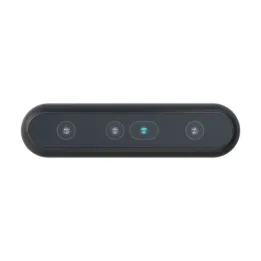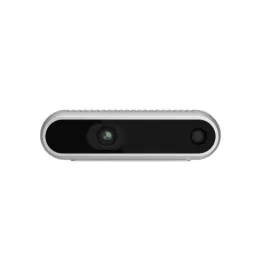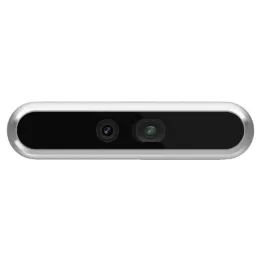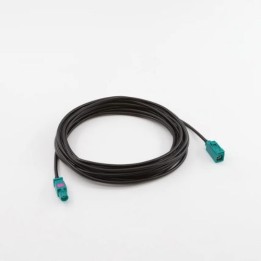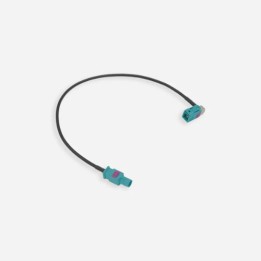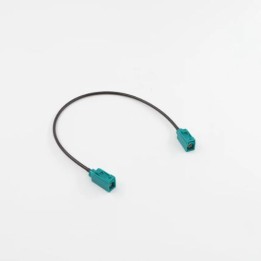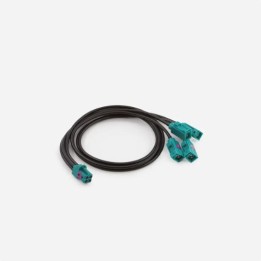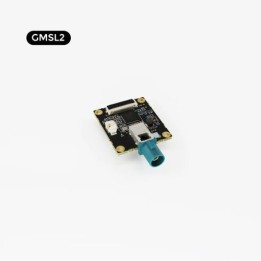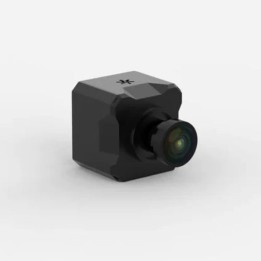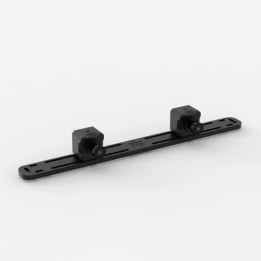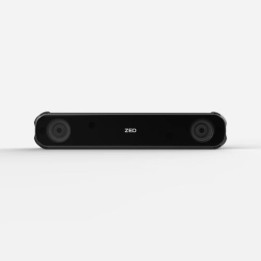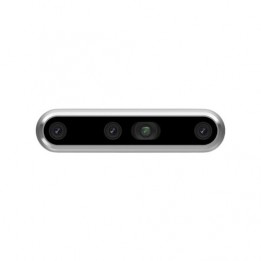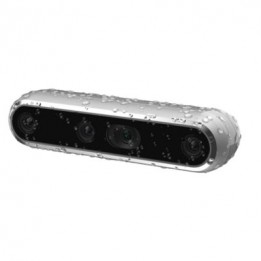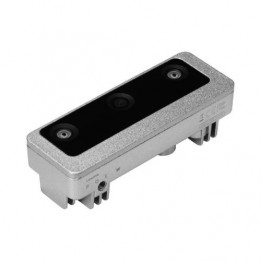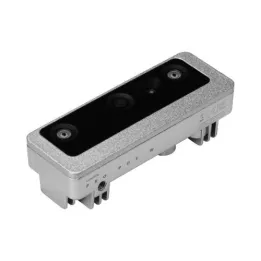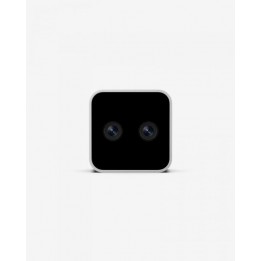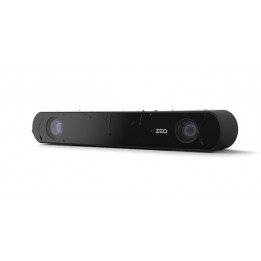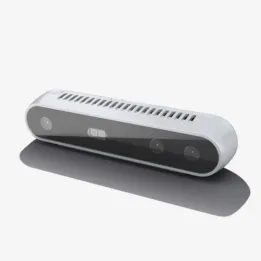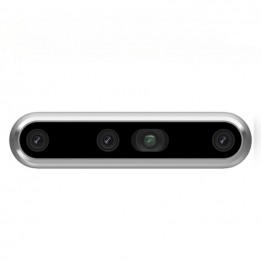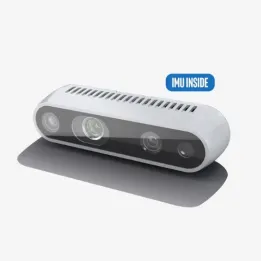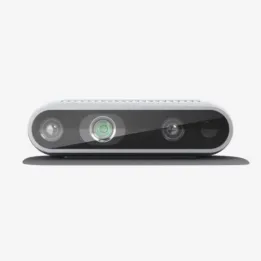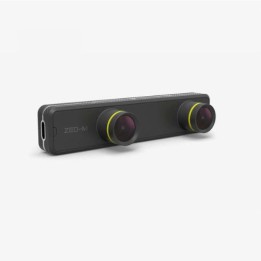Depth sensors
Depth cameras: what are they used for?
Depth cameras are used in many mobile robots (and autonomous cars) to assess the robot's surroundings with a great accuracy. They can also be used for precision gripping tasks (medical, high-tech industry).
Depth cameras (or 3D cameras) are able to work inside and outside, in a wide range of lighting conditions.
Constraints of mobile robotics
Autonomous mobile robots are often required to move in dynamic environments (stores, hospitals, airports, etc.). The robot must be able to slow down depending on the density of the crowd, stop at the last moment if facing an obstacle, and find the most appropriate path on its own.
A dynamic environment also implies that items can be often moved around (construction sites, industrial sites, etc.). Hence, mobile robots must be highly responsive (in real time) and extremely accurate.
Taking the time to select the sensors that will be fitted on your AMR is therefore a key factor in any robotics project.
The 3 most common sensors used in robotic vision
For vision, the sensors chosen are often :
- Depth cameras
- LiDAR
- Ultrasonic proximity sensors
These sensors are complementary and offer the robot a highly accurate sense of its environment.
Depth cameras
They render what human eyes see in the most reliable way possible: they distinguish shapes, colors and movements. They have a wide angle view. The stereo image detection technology uses two cameras to calculate the depth of the image (thanks to the merging of the two images received separately).
These cameras tend to have false positives or "ghost". Other sensors, such as LiDAR or ultrasonic sensors, are often use to enhance or correct the camera's data collection.
LiDAR
LiDAR measures the distance between itself and a target. It will be able to recreate in real time a 3D map of its surroundings (point cloud). It is a fast and accurate technology, however, LiDARs cannot detect any glass surfaces or mirrors.
Ultrasonic proximity sensors
Ultrasonic proximity sensors can detect glass and mirror.
Generation Robots, distributor of Intel RealSense and Stereolabs cameras
Stereolabs cameras: high performance sensors
ZED cameras are passive depth sensors. This means that they do not emit laser or IR light like active sensors. Several passive sensors can be used at the same time without any kind of interference. They are also not affected by sunlight.
ZED stereo cameras have a high resolution and frame rate compared to active sensors. They have a longer depth range than active sensors.
Intel Realsense cameras: good performance + GPU
The big asset of Intel Realsense cameras is that they are equipped with a graphics card. No need to use a computer that has a GPU to make it work.
A NUC or even a Raspberry Pi can do the job, which can help lower the hardware costs for your project.
Luxonis cameras: robotics accessible to all
Luxonis cameras are turnkey products with the ability to run a first script in less than 30 seconds. They integrate AI, computer vision and image processing directly on the device. All cameras are based on Depth AI, an open-source software suite.
The brand markets a number of models with the option of choosing between the basic version or the PoE version. The PoE option is a more robust version with a waterproof housing that allows it to be used outdoors or in more hostile environments.
A stereo 3D camera over Ethernet with Vision SoC V5, built-in IMU and IP65 housing, designed for demanding industrial vision and robotics applications.
A compact stereo camera powered via USB-C, with IR Pass filter, IMU and infrared projector, ideal for easily adding depth perception to your prototypes and mobile robots.
A long-range stereo camera with IR Pass filter for reliable 3D vision in demanding environments, both indoors and outdoors.
High-performance GMSL2 Fakra cable (M-F), up to 10m, for reliable video transmission in demanding conditions.
Perfect for tight spaces, this angled GMSL2 Fakra cable optimizes the integration of your ZED X camera while ensuring reliable high-frequency video transmission.
This GMSL2 Fakra cable (Female-to-Female) ensures reliable and long-lasting video transmission, even in demanding environments. It is compatible with ZED X cameras.
Easily connect two ZED X cameras to your ZED Box with this GMSL2 1-to-4 Fakra cable, designed for high-frequency video performance.
Capture up to 8 ZED X cameras simultaneously with precise hardware synchronization and high bandwidth using the ZED Link Mono, Duo, and Quad capture cards.
The ZED X One is a high-performance depth camera designed for long-range 3D perception, teleoperation, and smart analytics, with multi-camera synchronization and integrated IMU sensors.
This robust aluminum mount allows you to attach two ZED X One cameras to a tripod while freely adjusting the distance between them. It offers a flexible setup for accurate depth capture from 5 cm to 100 meters.
The ZED X camera from Stereolabs is a high-precision industrial stereo vision solution, ideal for autonomous robotics, digital twins, and advanced research applications.
The RealSense™ Depth Camera D456 is based on the technology of the D455 USB camera, offering an increased range thanks to its 3 sensors.
The D457 camera is Intel® RealSense's first high-bandwidth stereo camera with GMSL/FAKRA interface. It comes with an IP65-rated housing, providing effective protection against dust and water splashes.
Need a high-performance camera with a wide field of view? OAK-D W offers both options and is effective in a wide range of projects.
OAK-D Pro W offers a wide field of view and is ideal for a multitude of possible projects.
The RealSense™ Depth Camera D405 is a stereoscopic camera module for short-range colour image capture both indoors and out.
The ZED 2i Depth Camera, replacing the ZED 2, comes with a new design, secure connectivity and new lens options. The ZED 2i by Stereolabs is an extremely powerful tool for all your vision-based robotics projects.
The D415 camera is another member of the small family of depth cameras developed by RealSense. It’s designed for developers in need of high perceptual accuracy, even at a distance of several metres.
It took 10 years of development and the creation of some D400 models for RealSense to ultimately produce one of the best depth cameras on the market. The D455 3D camera by RealSense offers an increased range of up to 10 metres, while maintaining precise vision of both depth and colour.
This alternative to the D435 depth camera has added image stabilisation to its repertoire of features with the addition of a 6-DoF IMU.
The RealSense D435 is a depth camera with a wide field of view and a maximum range of up to 10 metres. It’s particularly effective in low-light environments.
The ZED Mini is ideal for developers, researchers, and businesses looking to create immersive experiences or integrate 3D perception into their robotic solutions.

